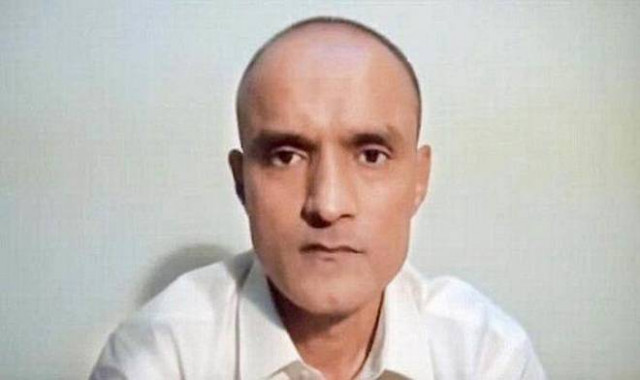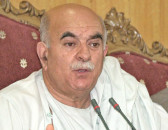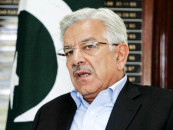ICJ to hold public hearings in Jadhav case from Feb 18
Jadhav was sentenced to death by a Pakistani military court on charges of spying and terrorism in April 2017

Indian terrorist Kulbushan Sudhir Yadav. PHOTO: FILE
Jadhav, 48, was sentenced to death by a Pakistani military court on charges of spying and terrorism in April 2017. India moved the ICJ in May the same year against the verdict.
It's going to be for the first time that a 16-judge bench of ICJ, led by a Muslim judge Justice Abdulqawi Ahmed Yusuf, would decide whether consular access should be given to the spy or not.
Former chief justice Tassaduq Hussain Jilani is also an ad hoc judge in this case.
India's Dalveer Bhandari, who is a permanent judge, is also a member of the bench.
In five cases, the ICJ gave consular access access to the applicant state but it's the first case, wherein the ICJ will determine whether consular access access should be given to the spy or not.
A delegation led by Attorney General for Pakistan Anwar Mansoor Khan is leaving today (February 15) to attend the hearing.
India will go first on February 18 (10:00-13:00 local time), then Pakistan will make submissions on February 19 (10:00-13:00 local time).
ICJ set to hold public hearings in Jadhav case
India will reply on February 20 (15:00-16:30 local time). Pakistan will make its closing submissions on February 21, 2019 (16:30-18:00 local time).
Barrister Khawar Qureshi (Queens Counsel) will argue on behalf of Pakistan while Harish Salve will give oral submission on behalf of India.
It is expected that the ICJ decision may be delivered by the summer of 2019. It is learnt that dozens of Indian journalists are going to attend the ICJ proceedings but numbers of Pakistani journalists are very less due to denial of visa by the Dutch embassy in Pakistan.
Indian case
India argues that Commander Kulbhushan Jadhav is an innocent businessman who was kidnapped from Iran, brought to Pakistan and tortured to confess that he was a commander in the Indian Navy working with Research and Analysis Wing (RAW), India's primary foreign intelligence agency.
India argues that it was entitled to obtain consular access for Jadhav as soon as his detention was made public by Pakistan on March 25, 2016.
India argues that the trial and conviction of Jadhav for espionage and terrorism offences by a military Court on April 10, 2017 was "a farce".
India contends that the denial of consular access to Jadhav requires the ICJ to "at least" order his acquittal, release and return to India.
In its written pleadings, India had accused Pakistan of violating the Vienna Convention by not giving consular access to Jadhav, arguing that the convention did not say that such access would not be available to an individual arrested on espionage charges.
Pakistan's response
Pakistan rejects all of the Indian allegations. Pakistan points to evidence obtained from Jadhav after his arrest, and during the criminal process leading to his conviction as amply demonstrating his activities in fomenting terrorism and engaging in espionage within Pakistan.
Pakistan maintains that it would be incompatible with international law for someone sent as a spy/terrorist by a state to be afforded access to officials of that state as India asserts.
Pakistan also points to an express Agreement on Consular Access dated May 21, 2008 between India and Pakistan, which allows each state to consider a request for consular access "on its merits" in a case involving national security.
Furthermore, Pakistan points to the uncontradicted evidence that Commander Jadhav was provided with an authentic Indian passport under a Muslim name by the Indian authorities, as a clear and obvious link between his conduct and the government of India. Such conduct being a blatant violation of international law should bar any claim for relief from a court.
Pakistan to submit evidence against Indian spy Jadhav on Feb 19: Qureshi
India refuses to reply on this issue and (unconvincingly) describes it as "mischievous propaganda".
In addition, Pakistan noted that in all of the ICJ's previous decisions concerning Article 36 of the Vienna Convention on Consular Relations 1963 (which involved death sentences imposed by the USA), the court made it clear that it was not a court of criminal appeal and the presence of "effective review and reconsideration" by domestic courts was an appropriate remedy, even if a breach of the right to consular access had been established.
The high court and Supreme Court provide such review as confirmed by the leading UK-based military law experts.
India has failed to explain why the Agreement on Consular Access between India and Pakistan dated May 21, 2008 (which India drafted), and which provides [at Article (vi)] for either state to be entitled to consider a request for consular access "on its merits" where it involves a person implicated in national security matters, does not apply in this case. Why not? India fails to explain why UK-based military law experts are wrong when they say that Pakistan's high court and Supreme Court provide an effective review and reconsideration of the military court process.
Legal opinion
Renowned lawyer Saiful Malook says that Pakistani legal team should affectively pursue the case as it should expose that how India is aiding and abetting acts and funding terrorist activities in Pakistan. The counsel contends that consular access cannot be given to a spy.
Meanwhile, in an interview with an international newspaper published on July 16 last year, Pakistan's attorney Qureshi gave details of written submissions in the case.
He stated that the ICJ has also been asked to consider whether India has behaved illegally by providing Jadhav with an authentic Indian passport in the name of "Hussein Mubarak Patel".
A very eminent UK expert has provided evidence that Jadhav used this passport at least 17 times to come into and go out of India. He confirmed that the passport was issued by Indian authorities. The inference is that India gave Jadhav the false Muslim identity for improper purposes. India's answer has been to say it does not need to answer this point.
"The 'Passport Issue' has recently also been raised by respected Indian journalists Praveen Swami and Karan Thapar. They have been accused of spreading 'propaganda' and, sadly, also been called 'traitors' for doing their job as professional journalists. No real answer has been given on this point, as well as most of the other arguments—apart (with respect) from resort to 'spin'," Qureshi stated.
In his interview, Qureshi also submitted that world-renowned UK military law experts have given expert evidence concerning Pakistan's military courts system, with reference to the military courts in the UK, US, India and other key jurisdictions. They have confirmed that effective review of the decisions of Pakistan's military courts is potentially available before the high court of Pakistan.
Likewise, Qureshi said India says Jadhav recently retired from the Indian Navy (but not when or why), and suggests he was kidnapped from Iran and smuggled into Pakistan to extract a false confession. India says the entire legal process against him in Pakistan was unfair, and demands that the ICJ "at least" orders his acquittal or release. India says Jadhav should have been given immediate consular access, he added.
"Pakistan says Jadhav was a naval commander who was working for RAW when arrested. The ICJ has been asked to consider whether individuals suspected of espionage had in practice often been excluded from the right to consular access—an argument never raised or considered previously. The ICJ has now exceptionally invited all states that signed the VCCR to respond to Pakistan's argument on this point, which is based upon the material practice of the US, Soviet Union and China, including the famous Gary Powers case (given the Hollywood treatment in The Bridge of Spies), as well as commentaries from experts in this field."



















COMMENTS
Comments are moderated and generally will be posted if they are on-topic and not abusive.
For more information, please see our Comments FAQ